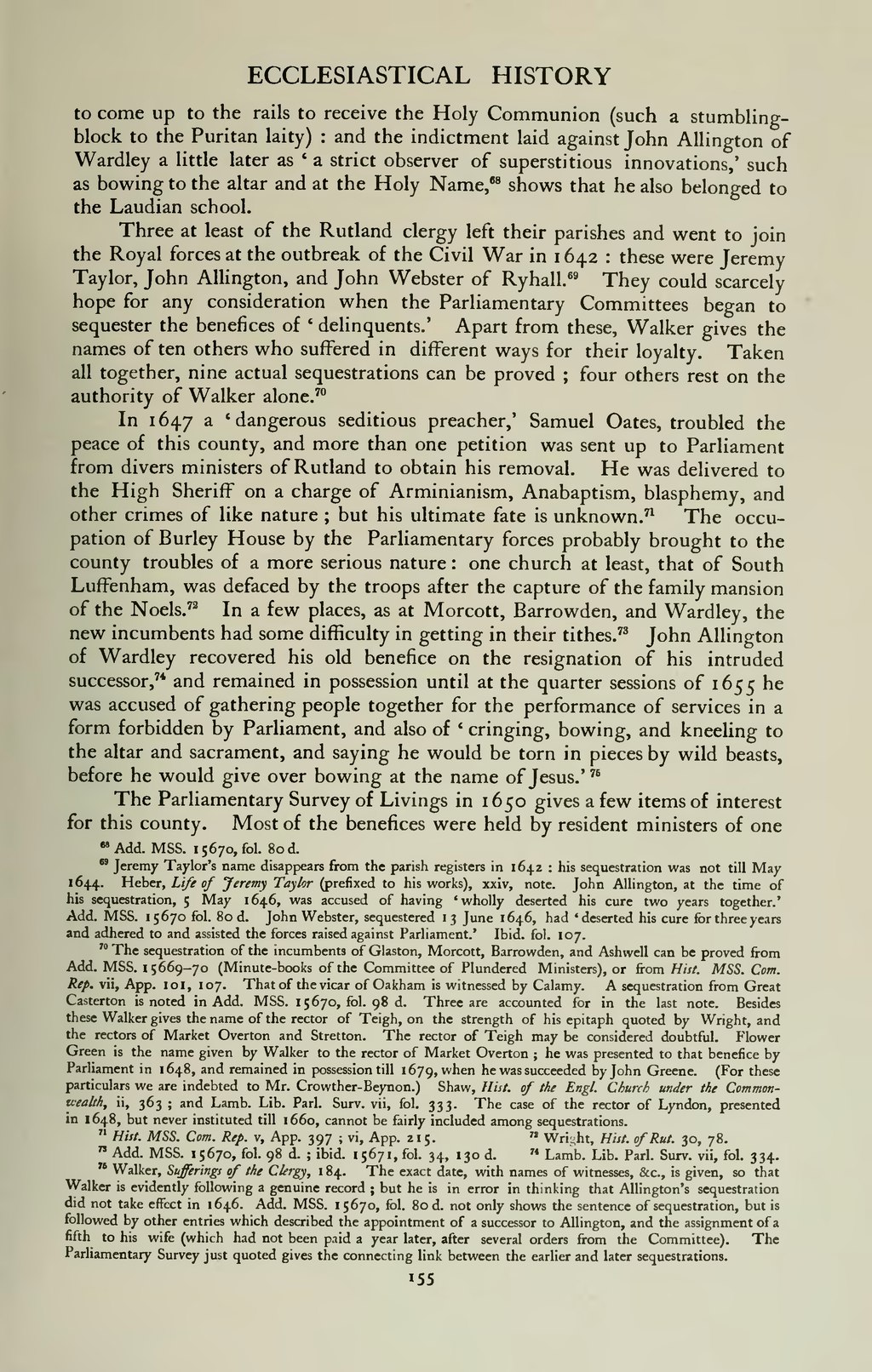ECCLESIASTICAL HISTORY to come up to the rails to receive the Holy Communion (such a stumbling- block to the Puritan laity) : and the indictment laid against John AUington of Wardley a little later as ' a strict observer of superstitious innovations,' such as bowing to the altar and at the Holy Name,'^ shows that he also belonged to the Laudian school. Three at least of the Rutland clergy left their parishes and went to join the Royal forces at the outbreak, of the Civil War in 1642 : these were Jeremy Taylor, John AUington, and John Webster of Ryhall/^ They could scarcely hope for any consideration when the Parliamentary Committees began to sequester the benefices of ' delinquents.' Apart from these, Walker gives the names of ten others who suffered in different ways for their loyalty. Taken all together, nine actual sequestrations can be proved ; four others rest on the authority of Walker alone.'" In 1647 a 'dangerous seditious preacher,' Samuel Gates, troubled the peace of this county, and more than one petition was sent up to Parliament from divers ministers of Rutland to obtain his removal. He was delivered to the High Sheriff on a charge of Arminianism, Anabaptism, blasphemy, and other crimes of like nature ; but his ultimate fate is unknown." The occu- pation of Burley House by the Parliamentary forces probably brought to the county troubles of a more serious nature : one church at least, that of South Luffenham, was defaced by the troops after the capture of the family mansion of the Noels." In a few places, as at Morcott, Barrowden, and Wardley, the new incumbents had some difficulty in getting in their tithes." John AUington of Wardley recovered his old benefice on the resignation of his intruded successor,'* and remained in possession until at the quarter sessions of 1655 he was accused of gathering people together for the performance of services in a form forbidden by Parliament, and also of ' cringing, bowing, and kneeling to the altar and sacrament, and saying he would be torn in pieces by wild beasts, before he would give over bowing at the name of Jesus.'" The Parliamentary Survey of Livings in 1650 gives a few items of interest for this county. Most of the benefices were held by resident ministers of one "Add. MSS. 15670, fol. Sod.
- ' Jeremy Taylor's name disappears from the parish registers in 164.2 : his sequestration was not till May
1644. Heber, Life of Jeremy Taylor (prefixed to his works), xxiv, note. John AUington, at the time of his sequestration, 5 May 1646, was accused of having 'wholly deserted his cure two years together.' Add. MSS. 15670 fol. Sod. John Webster, sequestered 13 June 1646, had 'deserted his cure for three years and adhered to and assisted the forces raised against Parliament.' Ibid. fol. 107. ™ The sequestration of the incumbents of Glaston, Morcott, Barrowden, and Ashwell can be proved from Add. MSS. 15669-70 (Minute-books of the Committee of Plundered Ministers), or from Hut. MSS. Com. Rep. vii, App. loi, 107. That of the vicar of Oakham is witnessed by Calamy. A sequestration from Great Casterton is noted in Add. MSS. 1 5670, fol. 98 d. Three are accounted for in the last note. Besides these Walker gives the name of the rector of Teigh, on the strength of his epitaph quoted by Wright, and the rectors of Market Overton and Stretton. The rector of Teigh may be considered doubtful. Flower Green is the name given by Walker to the rector of Market Overton ; he was presented to that benefice by Parliament in 164S, and remained in possession till 1679, when he was succeeded by John Greene. (For these particulars we are indebted to Mr. Crowther-Beynon.) Shaw, Hist, of the Engl. Church under the Common- wealth, ii, 363 ; and Lamb. Lib. Pari. Surv. vii, fol. 333. The case of the rector of Lyndon, presented in 164s, but never instituted till 1660, cannot be fairly included among sequestrations. " Hist. MSS. Com. Rep. v, App. 397 ; vi, App. 215. " Wri-ht, Hist, of Rut. 30, 78. " Add. MSS. 15670, fol. 98 d. ; ibid. 15671, fol. 34, 130 d. " Lamb. Lib. Pari. Surv. vii, fol 334. " Walker, Sufferings of the Clergy, 184. The exact date, with names of witnesses, &c., is given, so that Walker is evidently following a genuine record ; but he is in error in thinking that Allington's sequestration did not take effect in 1646. Add. MSS. 15670, fol. Sod. not only shows the sentence of sequestration, but is followed by other entries which described the appointment of a successor to AUington, and the assignment of a fifth to his wife (which had not been paid a year later, after several orders from the Committee). The Parliamentary Survey just quoted gives the connecting link between the earlier and later sequestrations. 155
